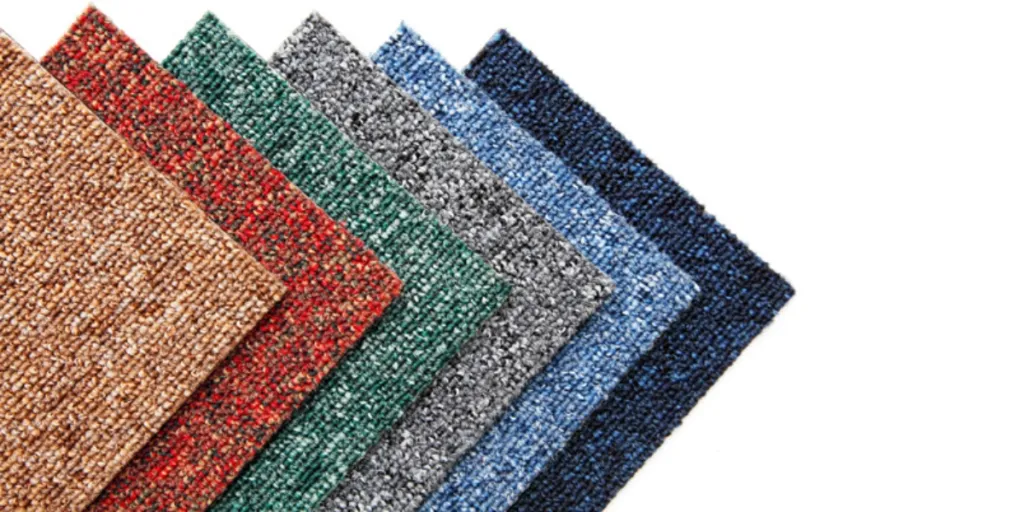Carpet tiles have gained popularity over the years due to their numerous advantages compared to regular roll-out carpets. Carpet tiles are perfect for commercial buildings since they’re easy to install and maintain. Additionally, carpet tiles are sound and waterproof, resistant to wear and tear, and can be installed on different floors like concrete and wood.
Understanding the carpet tile market potential is crucial for small businesses that want to invest long-term in the business.
Therefore, this guide will provide details on the carpet tile market situation, product types and materials, and how to choose the best carpet tiles that align with your consumer’s needs.
Table of Contents
Overview of the carpet tile market situation
Product types and materials
How to choose carpet tiles as a seller
Conclusion
Overview of the carpet tile market situation
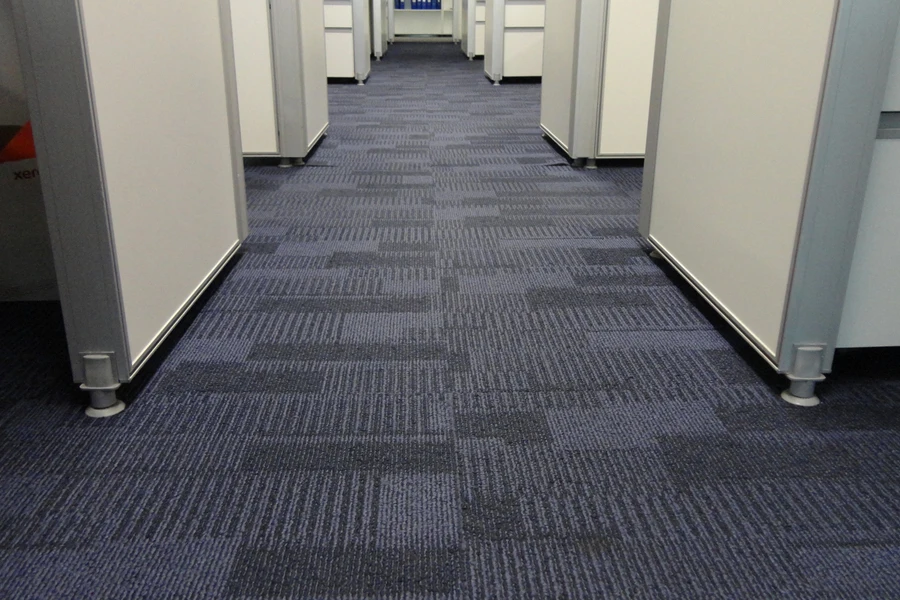
The carpet tile market has grown substantially over the years as people have recognized their value. Some of the growth factors include the increased demand for environmentally conscious alternatives and the versatility of carpet tiles.
Market value and forecasts
According to Verified Market Research, the carpet tile market size was valued at USD 10.5 billion as of 2023. Further, it’s expected to reach USD 17.2 billion with a compound annual growth rate (CAGR) of 6.6% by 2030.
Commercial use has the largest share of the market, as carpet tiles are popular in corporate buildings, hotels, and health facilities.
Factors driving carpet tile market growth
Several growth factors drive the carpet tile market. These include:
- Increased demand for roll-out carpet alternatives: Carpet tiles make a perfect alternative to the roll-out carpets. Carpet tiles are fast and easy to install and maintain in commercial buildings, reducing labor and maintenance costs. Their demand has gone up with businesses looking to reduce their expenditure and save time during renovations or remodeling.
- Increased building and renovation activities: Building and remodeling activities are on the rise, creating the need for fast and easy flooring solutions. North America, which accounts for the largest share of the carpet tile market, has the highest increase in commercial spaces that use carpet tiles for flooring. As these activities increase, so does the demand for carpet tiles.
- Interior design preferences by consumers: The time for boring floors is over, and more and more business owners are adopting decorative carpet tiles to enhance the aesthetics of their interiors. Carpet tiles have made their way into the hospitality, healthcare, and education sectors as businesses invest more in aesthetics.
- Increase in disposable income: Economic growth is a major driver of the carpet tile market. More consumers have increased their disposable income budgets, leading to increased investment in better flooring to improve living standards. Gone are the days when offices were bare floors, as more people have recognized the essence of working in aesthetically pleasing spaces.
Carpet tile market trends
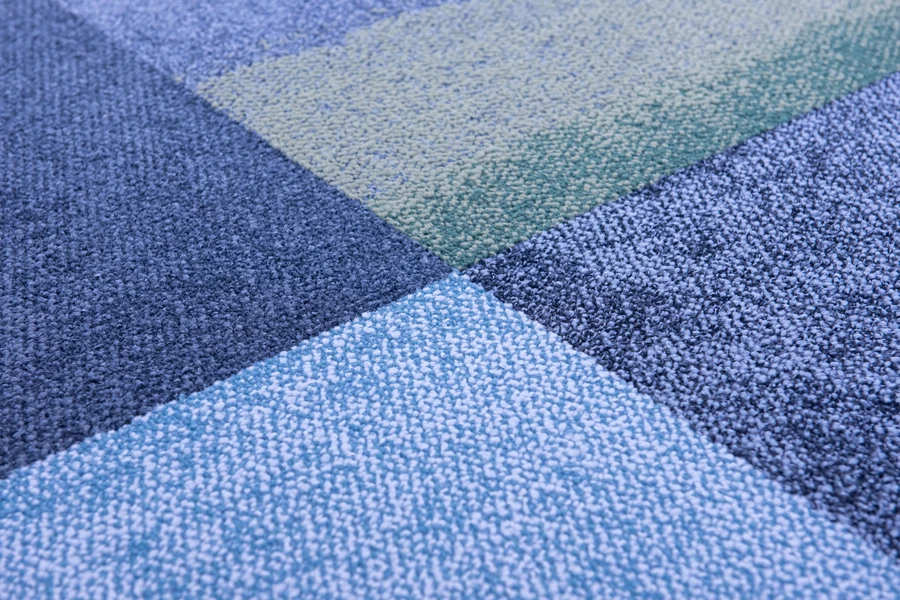
The carpet tile market is not immune to trends. Technology and innovation will fuel most of these trends as producers acknowledge consumers’ needs.
Some of the major trends you should look out for include:
- Environmental-friendly and sustainable materials:Consumers are more conscious of how products affect the environment. Many have adopted eco-friendly and sustainable options when it comes to carpet tiles. As a carpet tile seller, this is a trend you want to look out for to remain updated on the most eco-friendly carpet tiles. For instance, pay attention to materials like recycled fibers, biodegradable backing materials, and materials with low volatile organic compound emissions.
- Customized options for different industries: Customization and personalization is another trend in the carpet tile market. Instead of a one-size-fits-all approach, look out for bespoke carpet tiles for varying spaces. For instance, some consumers will prefer logos, patterns, or colors to distinguish their brand.
- Designs to suit modern buildings and spaces: Another trend for carpet tiles includes designs to align with modern buildings. These include varying shapes, styles, and patterns to reduce waste during installation on angled surfaces. Colors and patterns are also gaining traction, especially for wayfinding in complex buildings or zoning in open offices.
- Innovation and technology: Innovation is crucial in driving carpet tile trends. Some of the innovations to keep in mind include noise insulation, especially in open offices, as well as waterproof and fireproof carpet tiles.
Key carpet tile market players
The carpet tile market has attracted several key players. These include:
- Mohawk Industries
- Bentley Mills
- Interface
- Tarkett
- Milliken
These companies are some of the major producers of flooring solutions, including high-quality carpet tiles. They have invested in research and development to align with customers’ preferences and emerging trends.
While each company offers a unique selling point, their value propositions are based on sustainability, versatility, and durability.
Product types and materials
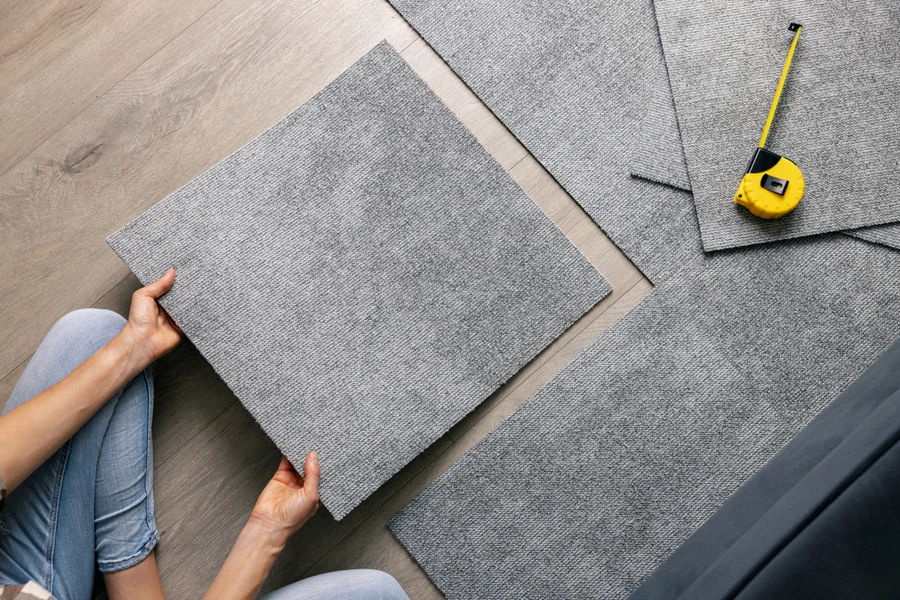
Carpet tiles are of different types depending on their shape.
According to the shape, the types include square and rectangular carpet tiles. Hexagonal and triangular-shaped carpet tiles also exist, but consumers use them mostly for aesthetics.
Carpet tiles can also be categorized based on the materials used during production. The most common types of materials include:
- Cotton
- Wool
- Synthetic fiber
- Recycled materials
Most carpet tiles are made from a blend of materials. Cotton and wool are mostly used for making eco-friendly tiles but are more expensive than other materials.
On the other hand, synthetic fibers like nylon, polyester, and polypropylene are more common. They are cheaper, hence they produce cheaper carpet tiles. They are also versatile and attractive since they’re glossier than other materials.
Some manufacturers also use recycled materials as part of their environmental responsibility, encouraging consumers who prefer eco-friendly living.
How to choose carpet tiles as a seller
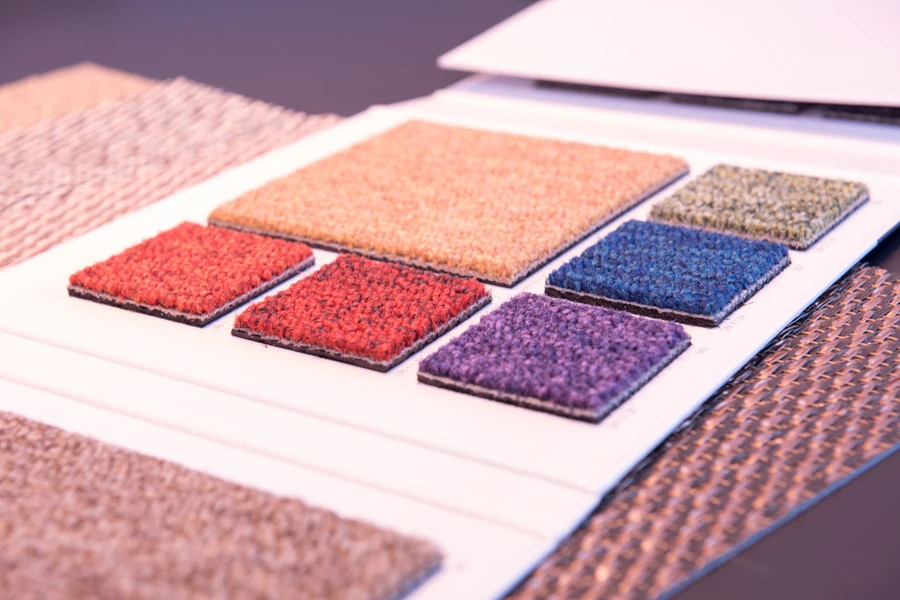
Having the right carpet tiles is essential to thrive as a small or medium business. Here are some things to consider when choosing carpet tiles that align with your business goals:
Your customers
Your target consumers will be a major factor in determining the type of carpet tiles you choose. Some things to consider about your consumers include:
- Use case: Do you want to sell carpet tiles for residential, commercial spaces, or both? Ensure you choose the right carpet tiles for each use case.
- Budget and pricing: Consider carpets with different price ranges to ensure you have products for customers with varying budgets. The idea is to go for carpet tiles your consumers can afford without compromising your business.
The materials
Carpet tiles are manufactured using different materials, which affect their durability and versatility. For instance, nylon carpet tiles are better for commercial spaces because they’re durable and resistant to water and fire. This makes them ideal for high-use spaces. Other materials like polypropylene are suitable for low-traffic areas like residential houses.
Ease of installation and maintenance
Some consumers prefer DIY installations to cut costs. Therefore, choose carpet tiles that are easy to install and maintain, especially for commercial use.
Carpet tile trends
Consider current trends like eco-friendly options, innovations, and technology, and other consumer preferences like colors and designs.
Conclusion
As carpet tiles continue to gain popularity, sellers need to keep track of the key drivers and trends of the market. Staying updated will help you know what carpet tiles consumers want and need.
Ultimately, you’ll be able to choose the right carpet tiles to suit your target customers and position your business as the ultimate source.
Alibaba.com is your partner for carpet tile solutions.
